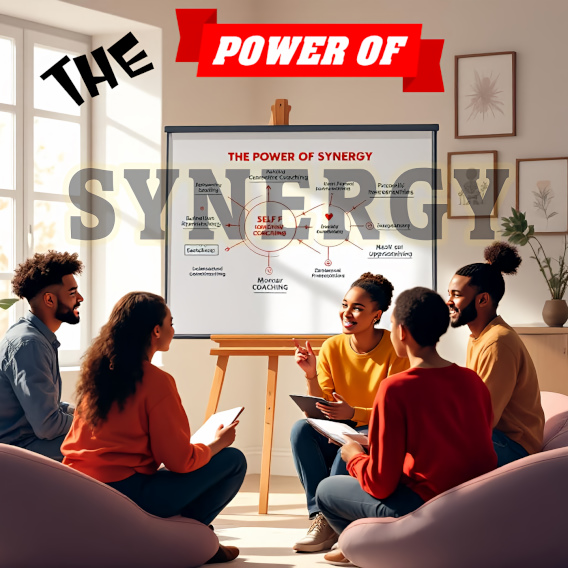The Power of Synergy, February 12, 2020
Yours Mine and Ours with Gabrielle Cardona
The gift of acceptance
“The Gift of Acceptance” Radio Show: 2/12/20
Introduction and overview of the show: 5 minutes
Yours, Mine, and Ours description and overview: 1 minute
The principle of “more joy in giving than in receiving”: 1 minute
That’s not a common occurrence anymore because the things that we’ve created (technology) have isolated us and made us more selfish; what’s more valuable than time and attention; thoughts and feelings?: 1 minute
How vital is giving to the success and happiness of the human soul?: 1 minute
What’s a “gift”; what does it mean to “give”? It’s something of value that someone shares to make your life better. It has to come from an original source that is of quality; in order to bring quality to you. If it’s not valuable, to make your life better, it’s not a gift, because it’s not a sacrifice of something good. The question to ask yourself: “Would you want that (whatever it is) if it was available without the person attached?” If you would, then the question is: “Are you willing to be good to the person offering it, in spite of your feelings for them, by accepting it?” If you’re not, then you need to deal with whatever is going on in that relationship. That’s your responsibility. As a healthy person. If you’re not ready to do that, then you need help becoming healthy, in order to do that.
*Thought-provoking questions: How often do the people in your life offer you things (time, attention, labor, objects)? What people (friends, family, co-workers, strangers)? What kind(s) of things do they offer you, generally, consistently? How often do you accept them? How often do you need the things that you reject? Why do you reject, vs accept? How often do you offer people things? What kind of things do you offer? How often do people accept them? : 1 minute
Question to ponder: How often do we think we’re doing someone a favor by not taking what they’ve offered: what if it’s gum? A drink? A ride somewhere? How often do we really just not want it?.........................How often do we just not want them?
What is the principle of giving?: 5 minutes
Sacrifice: willingness to let go of what is important to us: that could be our time, or talent, our resources, or attention (like a young child giving a rock or a picture to an adult that they love very much) 1 minute
Sensitivity: awareness of others’ needs and desires (that requires knowing what their thoughts and feelings are—before we offer them something that is, again, of value to us!) 1 minute
Sharing: responding to others’ needs (that requires awareness of what they’re thinking and how they’re feeling while we go through the daily activities of our own lives) 1 minute
Manners used to be instilled in people and they were mandatory. Not anymore. Like in the Hispanic culture: greetings, offering food, and respect for women and the elderly; letting them go first. But things like Feminism has distorted the value of giving, because it makes people defensive and hesitant to do things that before were just considered “nice”. 2 minutes
What is a true gift?: 7 minutes
The Biochemistry of Giving: hormones and chemistry within the human body are different from animals. Serotonin and oxytocin are two of the most powerful hormones in our bodies. The ways we prosper biologically are directly proportionate and specifically related to the way we interact with each other. It’s always about the quality over the quantity: 1 minute
Giving something that someone wants or needs, but still healthy: what things do we need? Food, clothing, shelter. Now, there are things we want. They are not always good, so be careful: 1 minute
Making someone feel truly good: being with them as they’re feeling good means we need to be comfortable being with them in a mental and emotionally intimate way, separate from that specific act; before and after. That doesn’t mean physically.: 2 minutes
Can be time, attention, labor, or physical objects: listening to someone you love talk can be very time-consuming. Or spending time with them; doing things like walking, casually. But the key to that is actually caring about what you’re hearing and paying attention; not letting your mind drift. Cooking a meal, running an errand, help paying a bill. Sitting next to them on the couch, quietly, as you watch the football game—or excitedly. The example of Uber Eats!; $30 for a delivery, so you can keep working at $150/hour.: 2 minutes
Is it perfunctory or sincere? That’s the key! Some societies are very strict about social protocol. Everyone ‘just does it’ because they have to. That’s actually potentially harmful to the people; the giver AND the receiver! Ask yourself if what you’re doing is real or just out of habit? Coming from benevolent sources and unselfish intentions: that’s the quality of your soul, separate from the person, before the act of generosity ever happens. What kind of person are you, in life? What is the quality of your generosity, in general?: 2 minutes
What happens when we accept?: 5 minutes
Our lives become better?...............maybe? What was given to us? Do we actually use the thing that was given to us? Do we appreciate it? What is a “better” life, actually? 2 minutes
The life of the giver becomes better! How did that child feel when we accepted their gift? How did they feel when they were creating it? How does someone feel when they are creating a surprise for us? How do they feel when we accept it? How do you feel when you care, truly, about someone, enough to sacrifice your time, energy, attention (thought/focus), and other resources? 3 minutes
What happens when we reject?: 2 minutes
We feel negative energy: it hangs for a period of time after we are done interacting. It affects how we feel and how we interact with others
We create negative energy in others: they are hurt and embarrassed. They are worried and doubt themselves. “What’s wrong? Why didn’t they want it? Don’t they love me?” Even as adults, we have these social anxieties and emotional vulnerability.
Thought-provoking questions: How often do the people in your life offer you things (time, attention, labor, objects)? What people (friends, family, co-workers, strangers)? What kind(s) of things do they offer you, generally, consistently? How often do you accept them? How often do you need the things that you reject? Why do you reject, vs accept? How often do you offer people things? What kind of things do you offer? How often do people accept them?
How can you get comfortable accepting?: 4 minutes
Genuinely feel good when you take something; like from a baby
Appreciate the act, separate from the gift—and the person attached.
Know that you are going to have and be better in your life as a result of giving someone else the positive emotional experience.
Are you going to use what was given? Keep it? THAT’S a big question!
Personality overview: 6 minutes
What is important to that person—by nature?: Do you know?
What is important to you—by nature? Some things: laughter, listening, foods, shows, music, affection, words of approval and appreciation,
Get to know others; take the time!: Not just quantity, but quality. While you’re with that person, are you really “with” them?
Let others know you; make the time!: Stop what you’re doing and let the people who love and care about you “in”. Think about it in terms of the big picture: what you’re doing now for 10 minutes will make their day/work/health/future better because it’s giving them the opportunity to have a better life.
Things to be given; different sources: 5 minutes
Physical: SP
Emotional: NF
Mental: NT
Moral: SJ
If you’re really resistant (for whatever reason) to accepting others, this is the key—the secret—to being able to do it; genuinely, in a quality way.
Functional Order overview: 10 minutes
Dominant
Auxiliary
Tertiary
Inferior
Functional Order access in order to accept: 6 minutes
Your inferior function in the context of your auxiliary function
Your tertiary function in the modality of your dominant function
The Power of Synergy

"Is relationship coaching right for me?"
Unlike conventional counseling, relationship coaching is about insightful education and listening more than talking.
Connection, communication, and accountability are the 3 elements to a successful relationship. All 3 are vital and perpetual. Relationships are about knowing yourself and understanding others so that what you share is healthy and beneficial--to you both.
Some questions to ask yourself:
- Are you truly ready for healthy change?
- Can you handle homework?
- How honest are you with yourself?
- How much support do you provide to others?
- Are you qualified for a relationship?
Only YOU know the answers!
Do you know what the things people say mean? How do you interpret their actions? Try taking a look at their personality! There are 16 different personalities, and one statement from one person can mean something completely different when coming from someone else.
Learn about what's behind behavior. Information from "experts" can confuse people. It is inaccurate. If you attend an MBTI seminar, you'll walk away knowing AND understanding what people do, how they do it, and why they do it. You'll also understand yourself.
"Relationship Coaching"
What's the formula to success? How can you reach your goals? Want some practical advice on how to get what you want out of life, without making it painful or complicated?
The Relationship Coaching program provides information, tools, resources, and support to set you up for success in every area of your life. Define your goals, know where you are, and create the path in life that YOU want to take. Check it out and take the Workbook that comes with it home with you for free!









